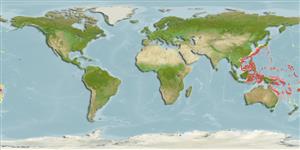Environment: milieu / climate zone / depth range / distribution range
Ekologi
laut dasar (demersal); kisaran kedalaman 176 - 600 m (Ref. 11356), usually 300 - 600 m (Ref. 116586). Subtropical
Western Pacific: from Taiwan and the Philippines to northwestern Australia and Vanuatu where it is common but rare off Japan.
Size / Weight / umur
Maturity: Lm ? range ? - ? cm
Max length : 7.5 cm SL jantan/; (Ref. 11356); 8.1 cm SL (female)
deskripsi pendek
Kunci identifiaksi (pengenalan) | Morfologi | Morfometrik
vertebrata, bertulang belakang: 13 - 16. This small deep-bodied species is distinguished by the following characters: convex dorsal head profile; second spine of first dorsal fin, spine of second dorsal fin, second spine of anal fin and spine of pelvic fin are serrated; A II + 7; pectoral-fin rays 14-16, pectoral length 20.3-26.5% SL; gill rakers 13-16; pseudobranchial filaments (13) 16-21; first anal-fin pterygiophore is long and straight, with broad tip and hollow; palatines and ectopterygoids are moderately wide, with 1-2 rows of denticles; orbital diameter 11.7-13.6% SL; posterior edge of maxillary plate is slightly concave; without longitudinal ridges on preopercular lobe; otolith very compressed (OL:OH = 1.35-1.4) (Ref. 116586).
Found on the continental slope (Ref. 75154).
Life cycle and mating behavior
Maturities | Reproduksi, perkembang biakan | Spawnings | Egg(s) | Fecundities | Larva
Schwarzhans, W.W. and A.M. Prokofiev, 2017. Reappraisal of Synagrops, Günther, 1887 with rehabilitation and revision of Parascombrops Alcock, 1889 including description of seven new species and two new genera (Perciformes: Acropomatidae). Zootaxa 4260(1):1-74. (Ref. 116586)
Status IUCN Red List (Ref. 130435)
ancaman kepada manusia
Harmless
penggunaan manusia
Alat, peralatan
laporan khas
muat turun XML
Sumber internet
Estimates based on models
Preferred temperature (Ref.
123201): 11.1 - 18.8, mean 13.5 °C (based on 93 cells).
Phylogenetic diversity index (Ref.
82804): PD
50 = 0.5001 [Uniqueness, from 0.5 = low to 2.0 = high].
Bayesian length-weight: a=0.00955 (0.00424 - 0.02152), b=3.02 (2.82 - 3.22), in cm total length, based on LWR estimates for this (Sub)family-body shape (Ref.
93245).
Trophic level (Ref.
69278): 3.4 ±0.5 se; based on size and trophs of closest relatives
Fishing Vulnerability (Ref.
59153): Low vulnerability (10 of 100).
